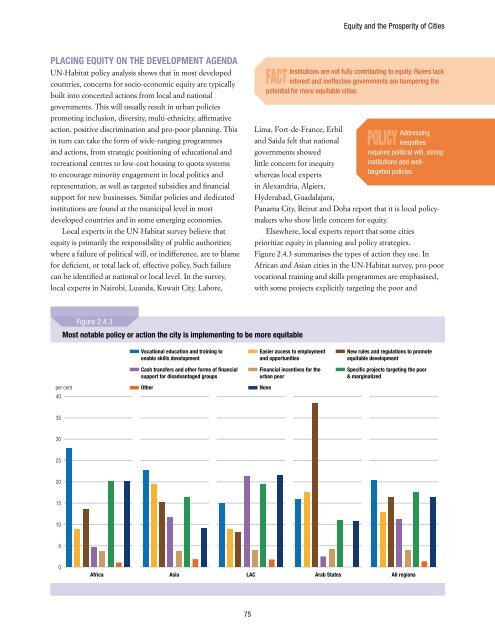state of the world's cities 2012/2013 - United Nations Sustainable ...
state of the world's cities 2012/2013 - United Nations Sustainable ...
state of the world's cities 2012/2013 - United Nations Sustainable ...
You also want an ePaper? Increase the reach of your titles
YUMPU automatically turns print PDFs into web optimized ePapers that Google loves.
Equity and <strong>the</strong> Prosperity <strong>of</strong> CitiesPlacing Equity on <strong>the</strong> Development AgendaUN-Habitat policy analysis shows that in most developedcountries, concerns for socio-economic equity are typicallybuilt into concerted actions from local and nationalgovernments. This will usually result in urban policiespromoting inclusion, diversity, multi-ethnicity, affirmativeaction, positive discrimination and pro-poor planning. Thisin turn can take <strong>the</strong> form <strong>of</strong> wide-ranging programmesand actions, from strategic positioning <strong>of</strong> educational andrecreational centres to low-cost housing to quota systemsto encourage minority engagement in local politics andrepresentation, as well as targeted subsidies and financialsupport for new businesses. Similar policies and dedicatedinstitutions are found at <strong>the</strong> municipal level in mostdeveloped countries and in some emerging economies.Local experts in <strong>the</strong> UN-Habitat survey believe thatequity is primarily <strong>the</strong> responsibility <strong>of</strong> public authorities;where a failure <strong>of</strong> political will, or indifference, are to blamefor deficient, or total lack <strong>of</strong>, effective policy. Such failurecan be identified at national or local level. In <strong>the</strong> survey,local experts in Nairobi, Luanda, Kuwait City, Lahore,factInstitutions are not fully contributing to equity. Rulers lackinterest and ineffective governments are hampering <strong>the</strong>potential for more equitable <strong>cities</strong>.Lima, Fort-de-France, Erbiland Saida felt that national policy Addressinginequitiesgovernments showedrequires political will, stronglittle concern for inequity institutions and welltargetedpolicies.whereas local expertsin Alexandria, Algiers,Hyderabad, Guadalajara,Panama City, Beirut and Doha report that it is local policymakerswho show little concern for equity.Elsewhere, local experts report that some <strong>cities</strong>prioritize equity in planning and policy strategies.Figure 2.4.3 summarises <strong>the</strong> types <strong>of</strong> action <strong>the</strong>y use. InAfrican and Asian <strong>cities</strong> in <strong>the</strong> UN-Habitat survey, pro-poorvocational training and skills programmes are emphasised,with some projects explicitly targeting <strong>the</strong> poor andFigure 2.4.3Most notable policy or action <strong>the</strong> city is implementing to be more equitableper cent40Vocational education and training toenable skills developmentCash transfers and o<strong>the</strong>r forms <strong>of</strong> financialsupport for disadvantaged groupsO<strong>the</strong>rEasier access to employmentand opportunitiesFinancial incentives for <strong>the</strong>urban poorNoneNew rules and regulations to promoteequitable developmentSpecific projects targeting <strong>the</strong> poor& marginalized35302520151050Africa Asia LAC Arab States All regions75





